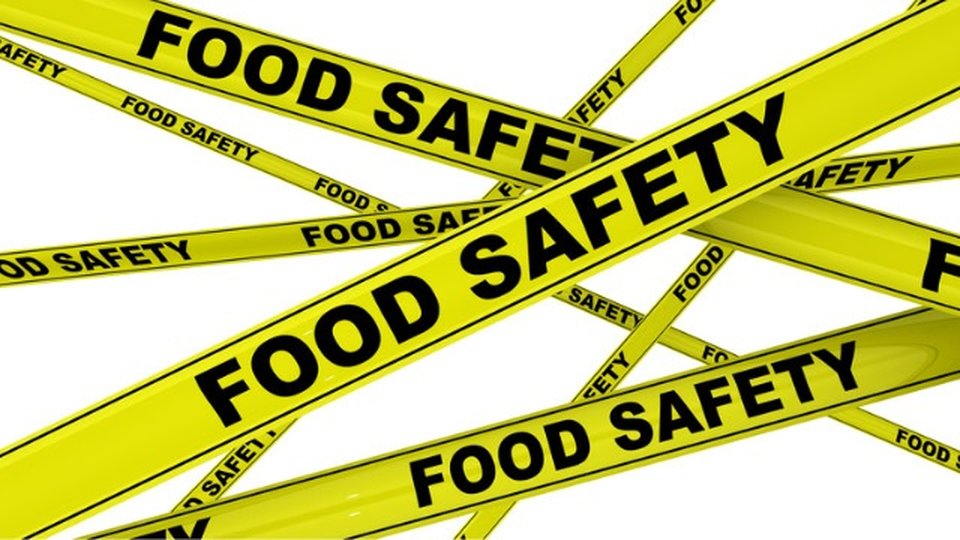Independent Operators
Common health code violations and how to avoid them
Food trucks, like any food-based enterprise, come under heavy health and safety scrutiny. Find out specific ways and strategies to ensure you don't get in trouble with the local health inspector.

September 21, 2020 by Richard Traylor — Writer, WebstaurantStore
Inspections from a local health department can occur at any time, without any advanced notice.
Along with all the other daily stressors of operating a business, worrying about a possible health inspection can be overwhelming for the food truck operator.
We've made a health code violations list to remind you of some of the most common health violations. Use our list as a general guide and make sure to research your local health department rules for the specific health codes for foodservice in your area.
1. Time and temperature control
Time and temperature control (called TTC) is one of the most important aspects of food safety. To correctly observe time and temperature control protocols, all foods must be kept at food-safe temperatures for the appropriate length of time. This includes hot foods, cold foods, raw foods, and cooked foods.
Failing to observe time and temperature control can lead to bacteria growth in your foods and the spread of foodborne illness. Health inspectors will test a variety of foods throughout your kitchen to make sure they are being held safely. This includes foods in hot or cold storage, foods on display, and foods that are being reheated.
In addition to checking food temperatures, health inspectors may be on the lookout for these common violations:
- Frozen meats or fish left out to thaw on counters (must be thawed in the refrigerator, in cold water, or in the microwave).
- Unattended foods or ingredients not in use (any foods taken out of cold storage must be prepped, cooked, or placed back in cold storage).
- Time-controlled foods with no time/temperature labels (foods that are being served or displayed with no temperature control need to be labeled and monitored).
Creating a HACCP plan that reveals potential TTC violations in your kitchen processes is the best way to ensure foods are held safely. Train staff on the proper use of thermometers, how to label foods, and how to thaw frozen foods.
2. Improper food storage
Any foods that are not being prepped or cooked must be stored properly to maintain food safety. The correct food storage procedure encompasses the types of food containers used, the application of date and identification labels, and the order and location of how products are stored on the shelves.
Food storage is important because it prevents spoilage and cross-contamination. Health inspectors will be checking the foods in cold and dry storage to look for date labels and expiration dates. They'll also be observing the manner in which foods are stored to make sure you're using approved containers and placing items in the correct order on your shelves. Refrigerated foods must be stored from top-to-bottom in this order: ready-to-eat food, seafood, raw beef and pork, ground meats and fish, raw and ground poultry.
Health inspectors will be looking for these common food storage violations:
- Storing refrigerated foods in the wrong order (raw chicken can never be stored on the shelf above other foods).
- Storing food containers on the walk-in floor (food boxes and containers should never be stored on the floor).
- No labels or dates on stored foods (any foods not in their original containers must be labeled).
- Using food containers that are not food-safe (never use residential food containers for commercial use).
To avoid a food storage violation, train your staff on the importance of labeling foods and using a first-in-first-out (FIFO) system. Stored foods should be checked on a daily basis and any expired, spoiled, or incorrectly stored foods should be disposed of immediately.
3. Improper tool and utensil storage
Safe storage doesn't just apply to food, it also applies to your kitchen tools and utensils. Clean, sanitized tools should be stored properly to avoid cross-contamination. Utensils must also be allowed to air dry after being sanitized, which requires being stored separately from other items with enough space for airflow all around the item.
Proper tool and utensil storage is important because if clean utensils come into contact with unclean surfaces, they can pass contaminants onto food. After washing and sanitizing, utensils must also be air dried. Failing to air dry your tools can lead to trapped moisture which encourages the growth of bacteria.
Be aware of the following common tool and storage mistakes:
- Stacking or laying clean cutting boards flat for storage (cutting boards should be stored upright).
- Storing clean chef knives in a drawer or bin (chef knives should be stored in a knife holder).
- Storing "in use" utensils in a dipper well without running water (dipper wells should have continuously running water to remove food particles).
- Drying dishes and utensils with a towel (all dishes, tools, and utensils must be air dried).
Create an organized kitchen with a designated home for every tool and utensil to avoid a possible storage violation. Train your dishwashing staff on the importance of air drying and make sure they know the correct location of all tools and utensils. You can also invest in shelving systems with tool organizers to make storage as easy as possible.
4. Poor personal hygiene
Successful personal hygiene is achieved by performing the appropriate behaviors like handwashing and avoiding the bad behaviors like touching your face while working or coughing over food. Hygiene also encompasses staff uniforms and the use of personal protective equipment (PPE) like gloves, face masks, and hairnets.
The good personal hygiene of your staff is critical to maintaining food safety in your food truck and preventing a health code violation. If your staff has already learned bad habits like not washing their hands correctly or failing to change their gloves at the appropriate time, it's likely they'll do this in front of an inspector without even realizing it. Not only that, poor hygiene is one of the biggest contributors to the spread of foodborne illness.
Health inspectors will be watching your staff closely to observe the following:
- Not washing hands correctly (employees must use soap, warm water, and wash hands for at least 20 seconds).
- Washing hands at the wrong sink (handwashing must be performed at a handwashing sink designated by a sign or poster ).
- Open employee beverages in work areas (employee beverages must be covered by a lid and only placed in designated areas).
- Wearing rings, bracelets, or watches on duty (food handlers may only wear a plain metal ring).
- No hairnets (food handlers must wear a cap or hairnet when preparing food).
- Not following correct face mask requirements (check state and local requirements for face mask guidelines in your area).
Help your staff build good habits by creating a hygiene training program. Perform regular follow-ups with your team and always provide clean hats, face masks, and aprons. Give your handwashing sink stations extra attention and make sure they are set up with soap and paper towels at all times.
5. Poor kitchen sanitation
The overall cleanliness of your kitchen requires that work surfaces and equipment are wiped down and sanitized regularly. This includes all the visible surfaces and the not-so-obvious surfaces that are hidden from view.
Kitchen sanitation is important because you cannot safely prepare foods on surfaces and equipment that are unclean. The buildup of grease on your equipment affects the taste of your foods and also presents a fire hazard. If you allow the unseen surfaces inside, beneath, and behind equipment to collect food debris, it attracts pests to your kitchen.
Health inspectors know which areas are the most likely to be neglected and will be on the lookout for the following:
- Mold or slime in the bottom of the ice bin (ice machine bins must be cleaned regularly to prevent mold growth).
- Unclean soda fountain nozzles (all soda nozzles should be taken apart and cleaned daily to prevent bacteria growth).
- Food debris and buildup beneath equipment (sweep and clean the areas beneath your equipment daily).
- Grease buildup on equipment (empty grease traps frequently and use degreaser on equipment).
Avoid a sanitation violation by instituting a food truck cleaning checklist. Train your staff to observe cleaning protocols on a daily, weekly, and monthly basis. Make sure to place a special emphasis on the areas that are often neglected, like your ice machine bin.
6. Cross-contamination
Avoiding cross-contamination in your food truck is one of the most important aspects of food safety. Contamination can occur at any stage of the cooking process, including the handling, storage, and preparation of foods. It can also occur from the misuse of tools and utensils, poor personal hygiene, and neglecting to maintain a safe, sanitary kitchen environment.
The contamination of foods by pathogens, chemicals, or foreign objects like glass or dirt is a hazard that can cause serious harm to your guests. Preventing the spread of foodborne illness from cross-contamination requires that you adhere to important food safety protocols.
Health inspectors will be paying close attention to any signs of a cross-contamination violation in your kitchen, including these common mistakes:
- Using the same cutting board or knives to cut chicken and vegetables (any surface that has come into contact with raw chicken should be sanitized).
- Storing the ice scoop in the ice machine (any object stored inside an ice bin can become a source of contamination).
- Using glassware to scoop ice (using a glass to scoop ice is a major health hazard because it could cause glass chips to contaminate the ice).
- Picking up glasses or serving plates by the rim (servers should never touch the surfaces that come into contact with food or beverages).
- Not storing cleaning towels in sanitizer solution (cleaning towels must be sanitized between uses to prevent cross-contamination).
7. Chemical use and storage
Somce kitchens require the use of powerful chemicals to clean and sanitize surfaces and equipment. Ensuring that these chemicals are used correctly and stored safely away from foods is all a part of proper chemical use.
Health inspectors catch a lot of operators off guard with chemical storage violations. It's very easy for a staff member to pick up a spray bottle of cleaning solution and accidentally set it down next to a food pan, even if it's just for a moment. If the health inspector observes any cleaning chemicals placed near food, it will result in a violation. You can also expect the inspector to test your cleaning and sanitizing solutions to make sure they are at the right concentration.
- Storing cleaning chemicals near food (do not store chemicals on shelves above food or anywhere near food in your kitchen)
- Storing toxic chemicals in unlabeled bottles (all spray bottles and containers must be labeled to identify the chemicals inside)
- Not using the correct concentration of sanitizer (your sanitizing solutions must contain the correct strength and concentration to kill germs)
You can avoid a chemical storage violation by creating designated locations for the storage of your cleaning supplies. Use sanitizer testing strips to make sure all of your sanitizing solutions contain the right concentration of chemicals.
The best way to avoid a health code violation on the day the health inspector shows up is to have an established food safety plan in place. Keep your food truck staff trained, provide opportunities for their education, and perform regular walk-throughs to ensure safety procedures are being followed.
About Richard Traylor
Richard Traylor graduated from Temple University in the winter of 2014 with a degree in Strategic Communications. After graduating, he taught English in South Korea for two years, during which he was fortunate enough to travel and see the world. In October 2016, he returned home and started to work in SEO Content at Webstaurant Store. This blog previously ran on Webstaurant Store.
 ChatGPT
ChatGPT Grok
Grok Perplexity
Perplexity Claude
Claude





